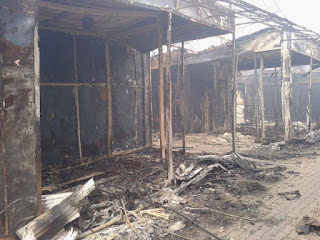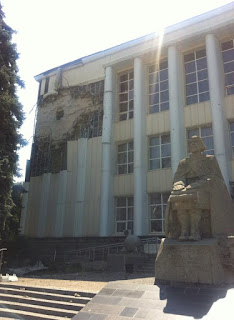Unfortunately, one really cannot avoid the issue of the war
with Russia and it's effect on education.
By now it should be evident to readers of this journal that Ukraine
faces many challenges in the area of special education. There are so many needs: Children with disabilities do not receive
appropriate educational services or are denied an education altogether. Older students with disabilities are
generally denied entrance into higher education programs or are permitted
enroll in very limited and stereotypical vocational programs. There is a belief among some educators that
individuals who are blind or deaf are good at manual labor, such massage or auto repair, but little else (not everyone believes this, of course, but it's a pervasive attitude). Students with disabilities fortunate enough
to attend a higher education program are not always permitted the freedom of choosing
a field of study that interests them.
Additionally, there are no university programs for educating special
education teachers. These are just a few
examples facing students, families and educators.
Before the war, significant gains were made. In Luhansk, a program at Volodymyr Dahl East
Ukrainian National University was developed by Dr. Olga Krsek that allowed deaf
and hard of hearing students to receive a genuine education and obtain the same
degree level as students without disabilities.
Tragically, all of her efforts have been destroyed by the war in the
Donbas, and the Russian leaders in Luhansk (and Donetsk) have no interest in
providing education to students with disabilities. Such an idea is incompatible with their outdated Soviet mindset. During the period of the Soviet Union, which the Russian terrorists in the Donbas are trying to resurrect, Soviet society was viewed as a perfect model for the rest of the world to emulate. Consequently, all individuals with disabilities were hidden away, because they were viewed as imperfect. Sadly, all of our progress in Luhansk towards equalizing education for students with disabilities has been lost.
The war situation in Ukraine is worsening rapidly as Putin
is becoming more aggressive and dangerous. Unless the West gets serious about
stopping him, there is little hope for ending this terrible conflict, as
Ukraine has limited financial and military resources. It is very depressing to
watch the endless suffering of the Ukrainian people and being completely
powerless to stop it. The war affects my work here in many negative ways. How we
can provide services to children with disabilities when there is no funding? It
is very difficult to reform education when all of the government’s focus,
attention and resources are directed at the war in the east. Ukraine is a
country fighting desperately to survive and under these difficult conditions,
providing an education for students with disabilities and developing new
special education programs has become a monumental challenge.
Here are some photos of damage in my former city of Luhansk, as a result of the fighting.

An apartment building in the Vatutin neighborhood
damaged by shelling. My building was located in this area.
(Photographer unknown)

The Central Market
This is one of the places where I used to shop in Luhansk.
(Photographer unknown)

The Central Market
(Photographer unknown)

The Central Market
(Photographer unknown)

The Central Market
(Photographer unknown)

The Central Market
(Photographer unknown)
Here are some photos of damage in my former city of Luhansk, as a result of the fighting.
The Library in Luhansk.
This breaks my heart.
I still have my library card.
This breaks my heart.
I still have my library card.
(Photographer unknown)

An apartment building in the Vatutin neighborhood
damaged by shelling. My building was located in this area.
(Photographer unknown)

The Central Market
This is one of the places where I used to shop in Luhansk.
(Photographer unknown)

The Central Market
(Photographer unknown)

The Central Market
(Photographer unknown)

The Central Market
(Photographer unknown)

The Central Market
(Photographer unknown)

